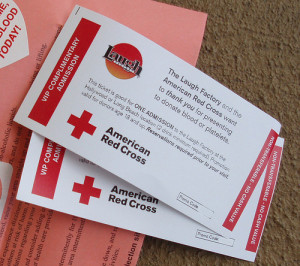Can We Make Gamification Work for Blood Donations?
As people all over gamify different things from work to education, one may ask where else it can be applied? Andrew Tipp, a writer/blogger/editor in digital publishing, discusses the possibilities of a new philanthropic avenue of gamification to be applied for blood donations.
To sum things up, here are some of his key suggestions:
1. Milestones – Allowing donors to reach different milestones in their donor career. He also suggest progress bars which I believe tie into the concept of milestones.
2. Reward System – Awarding points/badges to donors. Then potentially creating a reward system to reward those who have racked up serious points
3. Referrals – Awarding badges/points for referring people to donate.
4. Community & Competition – Setting up potential leaderboards or just comparisons between donors for their point totals. This can cause a bit of a competitive motivation for donors as a fun way to engage them.
Tipp makes many great points, but he also makes an interesting one about how gamifying blood donation can lead to people donating simply for the “game” itself, as opposed to good will. I don’t agree with this because it’s never a game in it’s own right. No one would donate blood in attempt to have fun. Gamifying the experience simply makes the donating more enjoyable and engaging. The potential for self glorification through social media can be a potential motivator, since people do tend to brag about how many points or badges they’ve racked up. However, end of the day, as long as the results are there, why should we care? In my opinion, results are results whether or not people are doing it for the right cause. Would you rather a selfish man not donate to a good cause or a selfish man donating for self glorification? Either way, we’ve reached our end goal in a fun and harmless way.
And as it turns out, it seems that New York has already implemented a similar system that Tipp imagined.
This is a great start in an attempt to gamify blood donations. They have a point system in place, but it is a bit confusing to say the least. They offer a wide array of rewards in exchange for points, however parts of the rewards list are not accessible to the public because of a technical error. The whole idea in itself is great, but the execution could have been better. A more easy to read/understand website with clear guidelines would definitely help a lot more. Also providing links that were not dead is a necessary update for them.
What do you think about gamifying blood donations? Post your comments below.
Flickr CC Image by Byron Villegas & Arienne McCracken










I believe gamifying blood drives this way can be dangerous since extrinsic rewards can destroy intrinsic motivators. The leaderboards, points and badges are good to motivate activities that aren’t intrinsically motivated, these work on boring tasks people don’t care to do.
If a gamification process were to be done with blood drives, it should be focused to create emotional hooks similar to those done in games-as-a-service. Maybe giving feedback on a life saved by their blood donated (?)
It should be tested. I’m just basing my beliefs in different sources so I might be wrong:
http://en.wikipedia.org/wiki/Overjustification_effect
http://www.amazon.com/Why-We-What-Understanding-Self-Motivation/dp/0140255265/ref=pd_bbs_sr_1?ie=UTF8&s=books&qid=1217270664&sr=8-1
You’re assuming people do it to be altruistic in the first place. As I mentioned in my comment, I know people who do it for the free t-shirt because it will look good that they’re a donor when they wear it.
I didn’t mention altruism, but intrinsic motivation, there’s a subtle difference. At this point any argument is purely introspective analysis and there’s no way of knowing what would work until you test the concept.
If you want to get deeper in design theory, Bartle’s player types explains that “achievers” are only 10% of players, while “socializers” are 80%. The leaderboard and points design seems to be aimed at “achievers” to me. I’m just saying that a gamified design focused creating emotional hooks like those in Games-as-a-service seems to be a better concept for this particular activity.
You have to be very careful when you try to gamify altruistically motivated things like blood donation. In Sweden they tested and studied this with monetary incentives: Carl Mellström, Magnus Johannesson, “Crowding Out in Blood Donation: Was Titmuss Right?” Journal of the European Economic Association 6, no. 4 (June 2008): 845-63
On the other hand, you can help altruistic programs by removing obstacles, like in Italy, where the government allowed employees to take the time of to donate blood: http://enterprise-gamification.com/index.php/en/blog/3-examples/115-8-examples-of-monetary-rewards-leading-to-worse-outcomes
The same happened in other areas, like in the Swiss village that was supposed to get a nuclear waste storage facility. More examples here: http://enterprise-gamification.com/index.php/en/blog/3-examples/115-8-examples-of-monetary-rewards-leading-to-worse-outcomes
I know people who donate just for the free tshirt or the refreshments afterwards! So I don’t think this would hurt anything. I donate when there’s a drive at work, but don’t make the extra effort to go to the blood center when I’m eligible again. If I could earn rewards for frequent donations, it would probably motivate me to make that trip.
I totally agree, Beth! In my opinion, gamifying blood donations won’t have any negative effects, it can only benefit. I know plenty of people who donate blood just so they can say they did it. They wear the t-shirts to flaunt their good deeds and even post instagram pictures just for the recognition. People tend to be more proactive when given an extrinsic motivator like self glorification.
Nice idea!